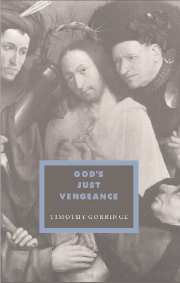Book contents
- Frontmatter
- Contents
- General editors' preface
- Acknowledgements
- List of abbreviations
- 1 Religion and retribution
- PART I THE CULTURAL FORMATION OF ATONEMENT: BIBLICAL SOURCES
- PART II MAKING SATISFACTION: ATONEMENT AND PENALTY 1090–1890
- 4 The ladder of all high designs
- 5 The wounds of Christ
- 6 Three angry letters in a book
- 7 The moral government of the universe
- 8 The age of atonement
- PART III CONTEMPORARY DIRECTIONS IN ATONEMENT AND PENAL THEORY
- Select bibliography
- Index
- CAMBRIDGE STUDIES IN IDEOLOGY AND RELIGION
7 - The moral government of the universe
Published online by Cambridge University Press: 25 January 2010
- Frontmatter
- Contents
- General editors' preface
- Acknowledgements
- List of abbreviations
- 1 Religion and retribution
- PART I THE CULTURAL FORMATION OF ATONEMENT: BIBLICAL SOURCES
- PART II MAKING SATISFACTION: ATONEMENT AND PENALTY 1090–1890
- 4 The ladder of all high designs
- 5 The wounds of Christ
- 6 Three angry letters in a book
- 7 The moral government of the universe
- 8 The age of atonement
- PART III CONTEMPORARY DIRECTIONS IN ATONEMENT AND PENAL THEORY
- Select bibliography
- Index
- CAMBRIDGE STUDIES IN IDEOLOGY AND RELIGION
Summary
Could it really be that all the talk about justice, goodness, law, religion, God and so on, was nothing but so many words to conceal the grossest self-interest and cruelty?
Tolstoy, ResurrectionAh! Little think the Gay …
Whom Pleasure, Power and Affluence Surround
How many Pine in Want, and Dungeon Glooms.
James ThomsonThe attempt to place the atonement theology of the eighteenth century in its context is made the more difficult because the century is the contemporary focus of the Streit der Historiker. Historians overtly committed to right- and left-wing ideologies interpret the same evidence very differently. Legal history has shared in the difficulty.
The rise in population has been described as ‘The outstanding feature of the social history of the eighteenth century’. In fact, this growth occurred only from mid century on, and the population actually fell both in the late 1720s and in 1741. Mid century the population of England stood, as it had at the beginning, at approximately 5½ million, three-quarters of whom lived and worked in the country. This had risen to 9 million at the time of the first census in 1801.
In 1700 London, the biggest city in Europe, with a population of more than five hundred thousand, was the only really great city in Britain. Norwich was the second city, with a population of nearly thirty thousand, followed by Bristol with twenty thousand and York, Exeter and Newcastle upon Tyne with something over eleven thousand each.
- Type
- Chapter
- Information
- God's Just VengeanceCrime, Violence and the Rhetoric of Salvation, pp. 156 - 192Publisher: Cambridge University PressPrint publication year: 1996



